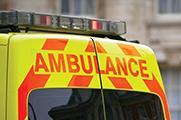Enabling patients to visit high street opticians for the treatment of minor conditions is convenient and also takes the pressure off secondary care, says Dharmesh Patel

One of the best ways to make the most of NHS resources is ensuring patients are seen in appropriate settings. If we can cut the number of people who go to accident and emergency departments we will reduce pressure on budgets, allow hospitals to focus on the most urgent cases, and help patients be seen at times and places that are more convenient for them.
‘These visits mean extra pressure and costs for A&E, making it more difficult for them to deliver prompt care’
One area where we have begun to make progress in this way is in the treatment of minor eye conditions.
Across England, there are around 270,000 A&E visits a year by patients with eye conditions that could be treated elsewhere, such as dry eyes, conjunctivitis and even displaced contact lenses.
For patients, these visits often involve lengthy trips to hospital, sometimes with appointment times that are inconvenient for their other commitments.
These visits also mean extra pressure and costs for emergency departments, making it more difficult for them to deliver prompt care to the patients who need to be seen the most quickly.
One stop shop
To address this, some clinical commissioning groups in England have begun to provide community-based services for patients with minor eye conditions. These take advantage of the skills and availability of optometrists in the many optical practices in local high streets and shopping centres, so people with non-serious conditions can be treated quickly and easily without needing to go to A&E.
‘Services take advantage of the skills and availability of optometrists in the many optical practices in local high streets and shopping centres’
In my local area, Stockport, several thousand people a year were being referred urgently to specialist eye teams at hospital or presenting at A&E.
However, only around one in five of these patients actually needed secondary care, meaning the NHS locally was incurring unnecessary costs and many patients were attending A&E when they could have been retained in primary care.
To tackle this, commissioners in Stockport ran an any qualified provider procurement process for these services to be provided in communities. Optometrists from the local optical committees across Greater Manchester set up a not for profit company to act as a single provider, with support from the Local Optical Committee Support Unit.
This was open to all optical practices in the area, making it possible for commissioners to achieve multiple local access points across the area covered by Stockport CCG while only having to manage one contract; we were awarded the contract to provide the service from April 2013.
Best use of resources
The new minor eye conditions service allows patients to receive assessment and management for a range of conditions in their choice of 21 optical practices based in local high streets and shopping centres.
GPs and local optical practices now only need to refer urgent cases to secondary care, such as patients with retinal detachment.
‘In many cases, patients refer themselves to the new service, often presenting with problems that can be resolved without a hospital referral from their GP’
In many cases, patients refer themselves to the new service, often presenting with problems that can be resolved without the need for a hospital referral from their GP. When hospital referral is required, the assessment determines the appropriate urgency and pathway for referral and the patient choice of provider.
This allows hospital based ophthalmologists to assess and treat the patients with the most severe conditions. By ensuring specialist skills and equipment for minor eye conditions are available to patients in community based practices, these hospital services can be used as effectively as possible.
Reduce demand for hospital care
In the first nine months of the Stockport service we have seen 2,257 patients, many who would otherwise have attended A&E or their GP. Of these patients, fewer than 16 per cent were referred to secondary care and five per cent to a GP. The rest have been treated through the local service. In addition, patient satisfaction with the service is extremely high at 99.8 per cent.
This is reflected in reduced referrals to secondary care ophthalmology and better access to GPs, with hundreds of GP appointments released by deflection to the service. They then have more time to spend with priority cases in surgery, freeing up diminishing time, allowing these services to focus on patients who really need to be there.
At the same time, the community based service is more convenient for patients, who can now access services quickly at times and locations that are more suitable for them. It also avoids the previous, anxious long waits for a hospital appointment when they were routinely referred to the hospital by their GP for a minor eye problem.
‘The community based service is more convenient for patients, who can now access services quickly at times and locations that are more suitable for them’
The model is now being used elsewhere in Greater Manchester, for example in Heywood, Middleton and Rochdale, which also expects to treat more than 2,000 people a year in local practices.
In Stockport we have also introduced similar community based services for patients with other eye conditions, including cataracts and suspected glaucoma.
Yet, despite the success of these community based minor eye conditions services, just 12 per cent of CCGs across England have commissioned similar services, according to LOCSU. This is despite guidance from the Royal College of Ophthalmologists and the College of Optometrists that as many as 78 per cent of people attending eye casualty may have conditions that can be deemed “non-serious”.
The new service does not seek to replace existing parts of the NHS, such as hospitals and GP surgeries, but instead targets healthcare resources as effectively as possible, so patients can quickly access the care that is most appropriate for them.
Dharmesh Patel is an optical lead for the Local Optical Committee Support Unit and chair of the Greater Manchester Local Eye Health Network



























3 Readers' comments